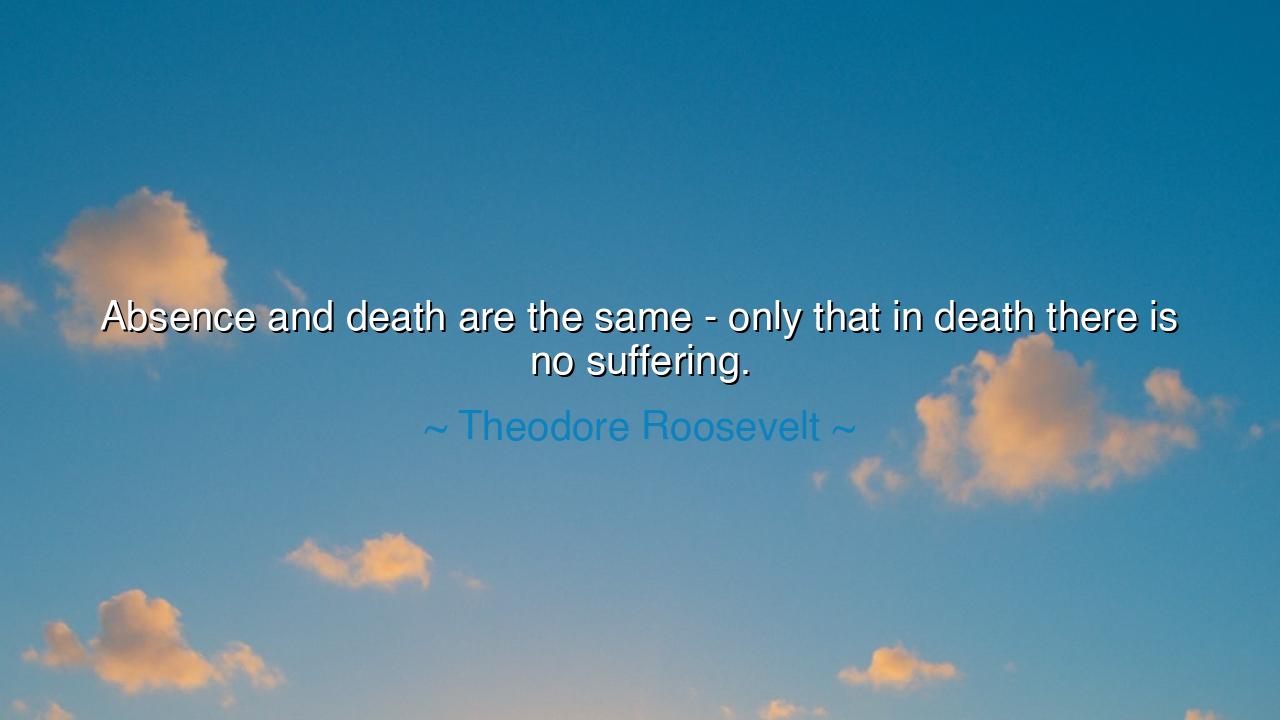
Absence and death are the same - only that in death there is no






“Absence and death are the same—only that in death there is no suffering.” Thus spoke Theodore Roosevelt, a man of boundless vigor and indomitable will, yet one who knew the aching silence of loss. Beneath his words lies a truth both tender and terrible: that when one we love is gone from our side, whether by death or distance, the heart feels the same wound—the void where their presence once breathed warmth. For in absence, the body still lives, but the spirit grieves as though for the dead; and in death, the pain ends for the departed, but not for those who remain. Roosevelt, who lived as fiercely in love as he did in battle, spoke from the depths of personal sorrow, for he was no stranger to grief.
In the year 1884, the young Roosevelt was struck by a double tragedy that would haunt his soul forever. On the same day, in the same house, he lost both his beloved wife, Alice Lee Roosevelt, and his mother, Martha Bullock Roosevelt. His journal that night bore only a single black cross and the words: “The light has gone out of my life.” For him, absence was not a peaceful thing—it was torment, an open wound that time could not yet close. It is from this abyss that his quote seems to emerge, as both lament and revelation. He understood that death might bring rest to those who leave, but absence—that cruel lingering state between presence and loss—condemns the living to remember without relief.
Roosevelt’s words remind us that the pain of absence is uniquely human. Animals know loss, but only humans can dwell upon it. The mind replays memories like a cruel theatre: the echo of laughter, the shape of a hand, the scent of a familiar place. Each reminder is both blessing and blade. Death ends this cycle for the one who has passed, but for those who remain, absence becomes a living death, where one must carry the weight of memory without the balm of touch. And yet, in this agony, there is something sacred—the proof that love, once kindled, cannot die with the flesh.
Consider the tale of Odysseus and Penelope, that ancient mirror of endurance. For twenty years they were apart—he wandering among storms and wars, she waiting beneath her loom. To each, the other’s absence was a ghost more painful than death. Penelope’s heart suffered each dawn, wondering if her husband still drew breath. Yet in their mutual endurance, their love was not diminished, but purified. When Odysseus at last returned, it was not as the man who had left, but as one tempered by longing. Thus, absence, though akin to death, also holds within it the alchemy of transformation—for it teaches patience, gratitude, and the immeasurable strength of the heart.
But Roosevelt’s tone, more tragic than triumphant, speaks also of the inevitable cost of attachment. To love deeply is to risk the pain of absence. Yet he, who knew the rigors of war and the wilderness, did not preach avoidance of love—only acknowledgment of its power. For he saw that life’s richest joys are braided with sorrow, that one cannot have light without the shadow of its potential loss. In this way, his reflection is both an elegy and a call to courage: that even knowing love will bring suffering, we must love still.
And what lesson do these words carry to us, the living? They remind us that we cannot control loss, but we can choose how we honor it. When absence grips us, we must not surrender to despair, but let memory become our companion instead of our tormentor. To dwell only on pain is to die before our time; to transform pain into remembrance is to let love endure beyond the grave. Thus, the wise learn not to flee from grief, but to walk with it—to speak the names of the absent, to live in such a way that their presence remains woven through our actions and our kindness.
So, O listener, take this truth to heart: absence and death are both trials of the soul, yet each calls us to a different kind of strength. Death ends the journey of the body, but absence tests the resilience of the living. When someone you cherish is gone—whether by fate or distance—do not let the void consume you. Let it teach you the value of every moment shared, every word spoken, every touch given. For as Roosevelt knew, the world is full of loss, but it is also full of the power to endure it. Love fiercely, therefore, and live nobly; for though death may end suffering, it is through life, with all its pain, that love proves itself eternal.






AAdministratorAdministrator
Welcome, honored guests. Please leave a comment, we will respond soon